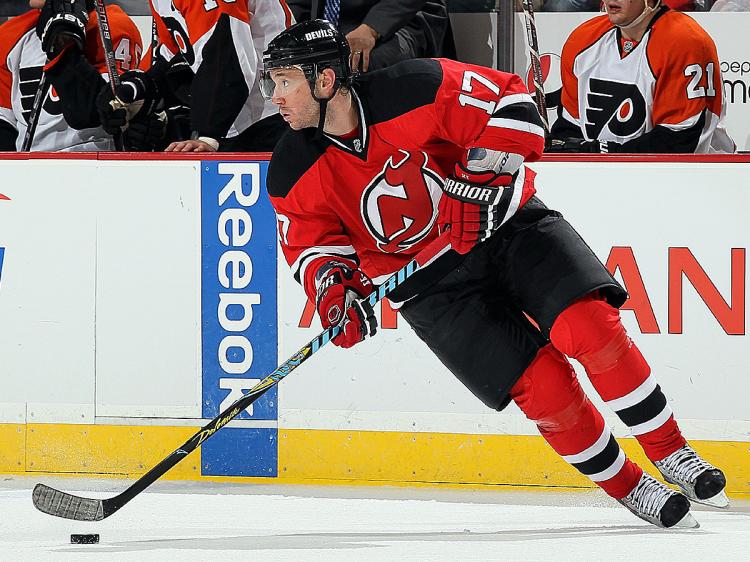Just when we thought the Ilya Kovalchuk free agency saga was over, it isn’t.
The most coveted free agent in hockey and first overall draft pick in 2001 for the Atlanta Thrashers decided to stay with the team he was traded to last season, the New Jersey Devils. To this end on Monday, it was revealed that Kovalchuk, 27, signed a 17-year, $102 million deal with the Devils (an average salary cap hit of $6 million per season.)
Under the contract, the Russian sniper would have been paid as much as $11.5 million per season declining to $550,000 per season in the last five years of the contract. The 17-year contract would have been the longest in NHL history and the contract would have remained on the Devils’ books until 2027.
Kovalchuk and New Jersey Devils brass including President and GM Lou Lamoriello held a press conference Tuesday afternoon for the media to announce officially the signing.
“Seventeen is a really lucky number for me,” said Kovalchuk, who wears No. 17. Kovalchuk also said that the decision was ultimately made on July 17 and that exactly four years earlier his father had passed away.
“Anything easy isn’t worth it,” said Lou Lamoriello, about locking up Kovalchuk for the rest of his career with the Devils. For Lamoriello, somebody who is known for his frugal spending, the chance to get a player like Kovalchuk was one to not be passed up. The Devils have not been able to get their hands on a player of his caliber through the draft.
But late on Tuesday night, it was reported by the Associated Press and by Jeff Marek of “Hockey Night in Canada” on Twitter that the NHL had rejected the Kovalchuk contract. At the time of press, nothing official from the NHL had been published.
Questionable Contract
This type of bizarre contract provides NHL teams with a way of achieving a desired salary cap charge per season while retaining top-notch talent with a big, lengthy contract.
Of course, Kovalchuk, 27, is unlikely to play until he is 44 and the last five years of the contract artificially lower the salary cap hit to $6 million per season.
In accounting terms, the asset (the player) is on the company’s books for much longer than its useful life. But the Devils can buy out the remainder of Kovalchuk’s contract when it becomes cheap to do so (the last five years) so as to gain back some of the cap space to sign other players. The Devils would thus be circumventing the NHL salary cap.
Other lengthy NHL contracts include Rick DiPietro with the New York Islanders (15 years $67.5 million), Alex Ovechkin with the Washington Capitals (13 years, $124 million), and Duncan Keith with the Chicago Blackhawks (13 years, $72 million).
“Kovy” turned down a 12-year $101 million contract extension from the Thrashers last season and was traded to the Devils in a multiplayer blockbuster trade.
Kovalchuk is a fast, powerful, and supremely talented scorer. He recorded six straight seasons of at least 40 goals including two 50-goal seasons. The right-handed shooter can electrify crowds with his speed and puck handling ability.
Kovalchuk had a dip in form when he joined the Devils last season. In 27 games, he scored 10 goals and added 17 assists for a goals per game average of 0.37. In his time with the Thrashers he averaged 0.55 goals per game.
Kovalchuk could renegotiate the contract or could entertain offers from the Los Angeles Kings, New York Islanders, or Russia’s KHL, all of whom were interested in his services. The NHL Players Association could fight back against the NHL, which could lead to arbitration.
Whatever the scenario, it was obvious that the contract did not “make sense” and the NHL had to put an end to this type of ultra-lengthy contract designed to circumvent the salary cap.







